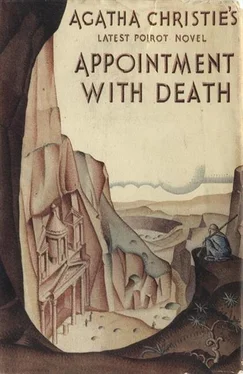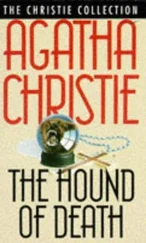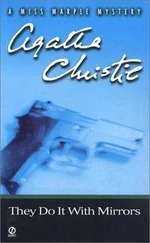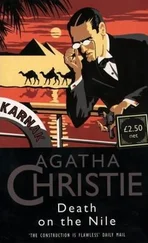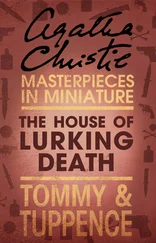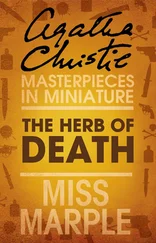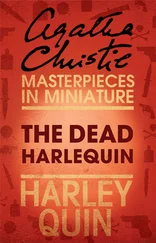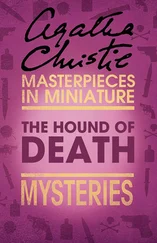Agatha Christie - Appointment with Death
Здесь есть возможность читать онлайн «Agatha Christie - Appointment with Death» весь текст электронной книги совершенно бесплатно (целиком полную версию без сокращений). В некоторых случаях можно слушать аудио, скачать через торрент в формате fb2 и присутствует краткое содержание. Год выпуска: 2007, ISBN: 2007, Издательство: Black Dog & Leventhal Publishers, Жанр: Классический детектив, на английском языке. Описание произведения, (предисловие) а так же отзывы посетителей доступны на портале библиотеки ЛибКат.
- Название:Appointment with Death
- Автор:
- Издательство:Black Dog & Leventhal Publishers
- Жанр:
- Год:2007
- ISBN:ISBN-10: 1579126928
- Рейтинг книги:4 / 5. Голосов: 1
-
Избранное:Добавить в избранное
- Отзывы:
-
Ваша оценка:
- 80
- 1
- 2
- 3
- 4
- 5
Appointment with Death: краткое содержание, описание и аннотация
Предлагаем к чтению аннотацию, описание, краткое содержание или предисловие (зависит от того, что написал сам автор книги «Appointment with Death»). Если вы не нашли необходимую информацию о книге — напишите в комментариях, мы постараемся отыскать её.
Appointment with Death — читать онлайн бесплатно полную книгу (весь текст) целиком
Ниже представлен текст книги, разбитый по страницам. Система сохранения места последней прочитанной страницы, позволяет с удобством читать онлайн бесплатно книгу «Appointment with Death», без необходимости каждый раз заново искать на чём Вы остановились. Поставьте закладку, и сможете в любой момент перейти на страницу, на которой закончили чтение.
Интервал:
Закладка:
3
"RAYMOND BOYNTON SAID THAT?" The exclamation broke from the Frenchman.
"You think it unlikely-psychologically speaking?" Poirot inquired placidly.
Gerard shook his head. "No, I should not say that. I was surprised, yes. If you follow me, I was surprised just because Raymond Boynton was so eminently fitted to be a suspect."
Colonel Carbury sighed. "These psychological fellers!" the sigh seemed to say. "Question is," he murmured, "what are we going to do about it?"
Gerard shrugged his shoulders. "I do not see what you can do," he confessed. "The evidence is bound to be inconclusive. You may know that murder has been done but it will be difficult to prove it."
"I see," said Colonel Carbury. "We suspect that murder's been done and we just sit back and twiddle our fingers! Don't like it!" He added, as if in extenuation, his former odd plea: "I'm a tidy man."
"I know. I know," Poirot nodded his head sympathetically. "You would like to clear this up. You would like to know definitely exactly what occurred and how it occurred. And you. Dr. Gerard? You have said that there is nothing to be done-that the evidence is bound to be inconclusive? That is probably true. But are you satisfied that the matter should rest so?"
"She was a bad life," said Gerard slowly. "In any case she might have died very shortly-a week-a month-a year."
"So you are satisfied?" persisted Poirot.
Gerard went on: "There is no doubt that her death was-how shall we put it?-beneficial to the community. It has brought freedom to her family. They will have scope to develop-they are all, I think, people of good character and intelligence. They will be, now, useful members of society! The death of Mrs. Boynton, as I see it, has resulted in nothing but good."
Poirot repeated for the third time: "So you are satisfied?"
"No." Dr. Gerard pounded a fist suddenly on the table. "I am not 'satisfied,' as you put it! It is my instinct to preserve life-not to hasten death. Therefore, though my conscious mind may repeat that this woman's death was a good thing, my unconscious mind rebels against it! It is not well, gentlemen, that a human being should die before his or her time has come."
Poirot smiled. He leaned back, contented with the answer he had probed for so patiently.
Colonel Carbury said unemotionally: "He don't like murder! Quite right! No more do I." He rose and poured himself out a stiff whisky and soda. His guests' glasses were still full. "And now," he said, returning to the subject, "let's get down to brass tacks. Is there anything to be done about it? We don't like it-no! But we may have to lump it! No good making a fuss if you can't deliver the goods."
Gerard leaned forward. "What is your professional opinion, M. Poirot? You are the expert."
Poirot took a little time to speak. Methodically he arranged an ashtray or two and made a little heap of used matches. Then he said: "You desire to know, do you not, Colonel Carbury, who killed Mrs. Boynton? (That is, if she was killed and did not die a natural death.) Exactly how and when she was killed-and, in fact, the whole truth of the matter?"
"I should like to know that, yes." Carbury spoke unemotionally.
Hercule Poirot said slowly: "I see no reason why you should not know it!"
Dr. Gerard looked incredulous. Colonel Carbury looked mildly interested. "Oh," he said. "So you don't, don't you? That's interestin'. How d'you propose to set about it?"
"By methodical sifting of the evidence, by a process of reasoning."
"Suits me," said Colonel Carbury.
"And by a study of the psychological possibilities."
"Suits Dr. Gerard, I expect," said Carbury. "And after that, after you've sifted the evidence and done some reasoning and paddled in psychology-hey, presto!-you think you can produce the rabbit out of the hat?"
"I should be extremely surprised if I could not do so," said Poirot calmly.
Colonel Carbury stared at him over the rim of his glass. Just for a moment the vague eyes were no longer vague- they measured-and appraised. He put down his glass with a grunt. "What do you say to that, Dr. Gerard?"
"I admit that I am skeptical of success… yet I know that M. Poirot has great powers."
"I am gifted-yes," said the little man. He smiled modestly.
Colonel Carbury turned away his head and coughed.
Poirot said: "The first thing to decide is whether this is a composite murder-planned and carried out by the Boynton family as a whole, or whether it is the work of one of them only. If the latter, which is the most likely member of the family to have attempted it?"
Dr. Gerard said: "There is your own evidence. One must, I think, consider first Raymond Boynton."
"I agree," said Poirot. "The words I overheard and the discrepancy between his evidence and that of the young woman doctor puts him definitely in the forefront of the suspects. He was the last person to see Mrs. Boynton alive. That is his own story, Sarah King contradicts that. Tell me, Dr. Gerard, is there-eh?-you know what I mean-a little tendresse, shall we say-there?"
The Frenchman nodded. "Emphatically so."
"Alas! Is she, this young lady, a brunette with hair that goes back from her forehead-so-and big hazel eyes and a manner very decided?"
Dr. Gerard looked rather surprised. "Yes, that describes her very well."
"I think I have seen her-in the Solomon Hotel. She spoke to this Raymond Boynton and afterwards he remained plantй la-in a dream-blocking the exit from the lift. Three times I had to say 'Pardon' before he heard me and moved."
Poirot remained in thought for some moments. Then he said: "So, to begin with, we will accept the medical evidence of Miss Sarah King with certain mental reservations. She is an interested party." He paused-then went on: "Tell me, Dr. Gerard, do you think Raymond Boynton is of the temperament that could commit murder easily?"
Gerard said slowly: "You mean deliberate, planned murder? Yes, I think it is possible-but only under conditions of intense emotional strain."
"Those conditions were present?"
"Definitely. This journey abroad undoubtedly heightened the nervous and mental strain under which all these people were living. The contrast between their own lives and those of other people was more apparent to them. And in Raymond Boynton's case-"
"Yes?"
"There was the additional complication of being strongly attracted to Sarah King."
"That would give him an additional motive? And an additional stimulus?"
"That is so."
Colonel Carbury coughed. "Like to butt in a moment. That sentence of his you overheard-'You do see, don't you, that she's got to be killed?'-must have been spoken to someone."
"A good point," said Poirot. "I had not forgotten it. Yes, to whom was Raymond Boynton speaking? Undoubtedly to a member of his family. But which member? Can you tell us something, Doctor, of the mental conditions of the other members of the family?"
Gerard replied promptly. "Carol Boynton was, I should say, in very much the same state as Raymond-a state of rebellion accompanied by severe nervous excitement, but uncomplicated in her case by the introduction of a sex factor. Lennox Boynton had passed the stage of revolt. He was sunk in apathy. He was finding it, I think, difficult to concentrate. His method of reaction to his surroundings was to retire further and further within himself. He was definitely an introvert."
"And his wife?"
"His wife, though tired and unhappy, showed no signs of mental conflict. She was, I believe, hesitating on the brink of a decision."
"Such a decision being?"
"Whether or not to leave her husband."
He repeated the conversation he had held with Jefferson Cope.
Poirot nodded in comprehension. "And what of the younger girl, Ginevra her name is, is it not?"
Читать дальшеИнтервал:
Закладка:
Похожие книги на «Appointment with Death»
Представляем Вашему вниманию похожие книги на «Appointment with Death» списком для выбора. Мы отобрали схожую по названию и смыслу литературу в надежде предоставить читателям больше вариантов отыскать новые, интересные, ещё непрочитанные произведения.
Обсуждение, отзывы о книге «Appointment with Death» и просто собственные мнения читателей. Оставьте ваши комментарии, напишите, что Вы думаете о произведении, его смысле или главных героях. Укажите что конкретно понравилось, а что нет, и почему Вы так считаете.
